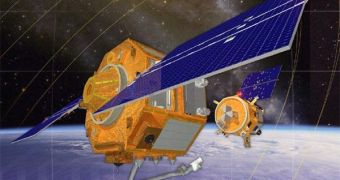A mechanic satellite designed to refuel and repair a partner in space launched on March 9, but not long after its launch, the satellite, called ASTRO (Autonomous Space Transport Robotic Operations), experienced guidance problems.
The $300 million Orbital Express mission is comprised of the Autonomous Space Transfer and Robotic Orbiter (ASTRO) servicing satellite and the NextSat target satellite. ASTRO is designed to approach NextSat and dock with it autonomously, without help from ground controllers - something no US spacecraft has previously been able to do. It will also refuel NextSat and use a robotic arm to operate on NextSat - and itself.
The problem arose because one of the spinning wheels that control ASTRO's orientation was not installed correctly. So when the software commanded the satellite to pitch one way, it moved in the opposite direction, says DARPA spokeswoman Jan Walker.
That is to prove that no matter how consistent the development budget is, the human error is still a major problem, even for NASA.
Though unplanned, it was the perfect opportunity for the satellite to prove its self-repairing capabilities, with the help of its 3.3-meter-long robotic arm.
A new software was sent up to the satellite to fix the guidance problems and account for the pitch momentum wheel, and the robotic arm did the actual repairing work, without the help of ground controllers. They just stood by in case something went wrong.
"This demonstration mission is the first step toward developing an operational system that can service satellites and support other space operations," says George Muellner, president of Boeing Advanced Systems, which built ASTRO.
The satellite will also act like a filling station for NextSat, transferring hydrazine fuel to the target satellite. Filling up the fuel tank is harder in space than it is on the ground because bubbles form in the fluid, so pistons will be used to push the fluid to its target location.
While some experts say satellites that navigate autonomously and inspect other spacecraft could be used to disable 'enemy' satellites, officials say Orbital Express is not designed to be used as an attack vehicle.
We'll have to take their word for it, or wait for news on mysterious Russian and Chinese satellites malfunctions...

 14 DAY TRIAL //
14 DAY TRIAL //